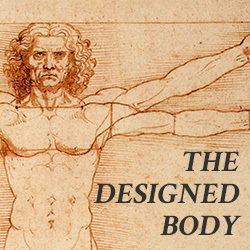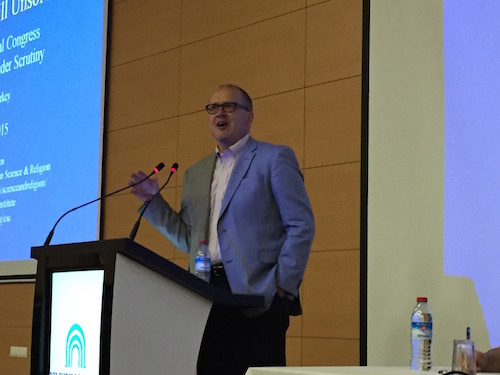Discovery Institute's Blog, page 161
May 18, 2015
Any Sufficiently Vacuous Evolutionary Explanation Is Indistinguishable from Magic

Intelligent-design theorists including William Dembski and Stephen Meyer have produced rigorous mathematical, logical, and empirical arguments showing that the mechanism described by the "chance hypothesis" is woefully inadequate to bring about the complex genetic information found in even the simplest life. Yet that has not stopped many a Darwinian from invoking chance as a cause of biological complexity. Information, they believe, "emerges" by accident.
Magic Mutations
One example is this...
May 17, 2015
Final Exit Network Is Convicted of Assisted Suicide

Final Exit Network, those suicide pushers and "counselors," have been convicted of assisting a suicide and interfering with a death scene in Minnesota. Good. From the AP story:
Final Exit Network was charged in the death of Doreen Dunn, 57, of Apple Valley, who had been living with intense pain for more than a decade after she had a bad reaction to a medical procedure.
According to trial testimony, Dunn's husband arrived home on May 30, 2007, to find his wife dead on the couch. The family an...
May 16, 2015
Listen: Humans Display Many Behavioral and Cognitive Abilities that Offer No Apparent Survival Advantage

On a new episode of ID the Future, Casey Luskin concludes his series discussing the top ten problems with biological and chemical evolution. This series is based on Luskin's chapter in the volume More than Myth, edited by Paul Brown and Robert Stackpole (Chartwell Press, 2014).
Here, Casey discusses a bonus eleventh problem: that humans display many behavioral and cognitive abilities that offer no apparent survival advantage.
Listen: Humans Display Many Behavioral and Cognitive Ability that Offer No Apparent Survival Advantage

On a new episode of ID the Future, Casey Luskin concludes his series discussing the top ten problems with biological and chemical evolution. This series is based on Luskin's chapter in the volume More than Myth, edited by Paul Brown and Robert Stackpole (Chartwell Press, 2014).
Here, Casey discusses a bonus eleventh problem: that humans display many behavioral and cognitive ability that offer no apparent survival advantage.
May 15, 2015
The Modesty Chronicles

They've got a humor-impaired satirist at The New Yorker called Andy Borowitz. This week he offers the following headline, "Scientists: Earth Endangered by New Strain of Fact-Resistant Humans." You can pretty much write the rest yourself, though I was surprised that he leaves out any direct mention of the obvious targets -- skeptics on climate change and Darwinian evolution. I suppose the reader is expected to fill those in for himself:
MINNEAPOLIS (The Borowitz Report) -- Scientists have dis...
Understanding Cardiovascular Function: The Challenge of Maintaining the Body's Water Content

Editor's note : Physicians have a special place among the thinkers who have elaborated the argument for intelligent design. Perhaps that's because, more than evolutionary biologists, they are familiar with the challenges of maintaining a functioning complex system, the human body. With that in mind, Evolution News & Views is delighted to present this series, "The Designed Body." Dr. Glicksman practices palliative medicine for a hospice organization.
 As we saw in the last preceding two article...
As we saw in the last preceding two article...
Heads or Tails: The Problem of Evolving Animal Body Plans
Nearly all the animals we know have bilateral symmetry at some stage of their lives, meaning they have right and left halves that are mirror images of each other. These animals also have a head and a tail, a top and a bottom to them. The technical terms are anterior/posterior (A/P) and dorsal/ventral (D/V) axes (plural for axis, not the wood-chopping instrument). The exceptions are things like sponges, jellyfish, sea anemones, and small creatures like the Volvox I wrote about last week.
Even...
May 14, 2015
Listen: Neo-Darwinism Has a Long History of Inaccurate Predictions About Vestigial Organs and "Junk DNA"

On a new episode of ID the Future, Casey Luskin continues his series discussing the top ten problems with biological and chemical evolution. The series is based upon Casey Luskin's chapter in the volume More than Myth, edited by Paul Brown and Robert Stackpole (Chartwell Press, 2014).
In this segment, Casey discusses the tenth problem: how neo-Darwinism has a long history of inaccurate predictions about vestigial organs and "junk DNA."
Adventures in Ankara

Last week, I hit the road for Ankara, Turkey, to participate in the 3rd International Congress on Evolution Under Scrutiny.
This conference, organized entirely by Turkish students, was held at Yildirim Beyazit University in Ankara, and featured several of the leading figures who deal with evolution and its relation to other fields, in Turkish (or Middle Eastern) science and philosophy. Among the speakers: Geneticist Rana Dajani addressed the conference from Jordan, via Skype, about "Evolutio...
The New Humanists: In The Atlantic, Erik Larson Aptly Puts a Name on a Movement

Discovery Institute fellow and ENV contributor Erik Larson has a beautifully insightful essay today, "The Humanist's Paradox," at The Atlantic. It draws together themes that Larson has written about here, particularly the overhyping of artificial intelligence both as a boon and a threat by people smart enough by far to know better.
Our friend Dr. Larson adds a new formulation to the discussion. He calls the skeptics and critics of AI and over-computerization the "New Humanists." How do they...
Discovery Institute's Blog
- Discovery Institute's profile
- 15 followers




